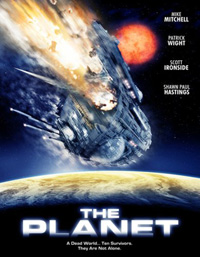 It is tempting, with a film like The Planet, to be condescending. Like watching a dog deliver Hamlet’s soliloquy, it is easy to be impressed that the performance is taking place at all and ignore the quality of the delivery.
It is tempting, with a film like The Planet, to be condescending. Like watching a dog deliver Hamlet’s soliloquy, it is easy to be impressed that the performance is taking place at all and ignore the quality of the delivery.
And make no mistake, the fact that The Planet exists at all is every bit as remarkable as a Bard-spouting mongrel. Making any kind of film is challenging but making a high-concept, effects-heavy sf film with a budget smaller than most student overdrafts is astonishing.
But, once we get over the shock that this puppy knows that to be or not to be is, indeed, the question, we still have to ask: Is it actually any good? My answer: Yes it is, although there are inevitable qualifications.
The Planet’s low budget does show through with too many filler shots of people running or walking to pad out its seventy minutes and the script doesn’t always deliver the moments of dramatic power or humorous relief that would raise the story out of its rather one-paced gait. However, The Planet also has some genuine strong points. It is, for example, a surprisingly refreshing change to watch a film where space-faring characters don’t speak American or in the plummy RADA-tones of the obligatorily British villain. I was shocked at how long it took me to adjust my own expectations when listening to the actors’ Scottish accents and at how much more real it made the characters feel.
The cast, none of whom will be immediately recognisable faces to anyone outside their own families, generally turn in creditable performances with the material at their disposal. I particularly liked Scott Ironside’s Vince and Patrick Wight’s McNeal, a pair of ordinary, blunt-speaking tough guys caught in a nasty situation who seem to be locked in a competition to see who can say the word “fuck” the most times in any one sentence.
And The Planet frequently transcends its limitations with regard to set design, special effects and in the director’s assured use of the camera. The film succeeds in creating a creditably believable alien world – with convincing props, some good effects and the intelligent use of location. The special effects, however, are a mixed bag. When they work well (such as in the opening space battle, the early monster attacks, and some nice simulated computer displays) they add immensely to the film, but some dodgy (and over-used) fire effects distract early on and the final sequence, when gigantic monsters bestride the planet, reveals the limitations of the budget too harshly. By then, however, The Planet has stored up more than enough credit to be forgiven for allowing its ambition to overstep its capability.
This is not the sort of film that wins awards or that gets cineastes raving over their cappuccinos, and it’s not without serious flaws. Perhaps, like a Shakespearian pooch, The Planet’s greatest achievement remains that it exists at all. But because of its ambition, surprising scale and the evident determination of cast and crew to deliver a final product that should have been far beyond what was possible with their resources, The Planet turns out to be an entertaining and likeable film. If nothing else the DVD of The Planet (available from www.stirtonproductions.com/) is worth owning just for the included documentary in which the cast talk with disarming frankness and good humour about the film’s production. You can read my interview with Mark Stirton, the film’s writer and director here.
One response to “THE PLANET”
[…] You can read my review of The Planet by clicking here. […]